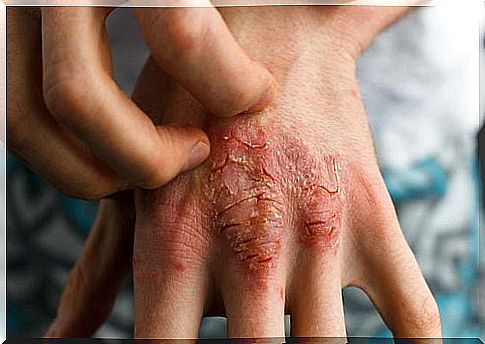How Can You Treat Psoriasis

How can you treat psoriasis? There are several options. The way doctors treat psoriasis depends on each patient’s medical situation.
There is no such thing as one type of psoriasis. This means that there are many treatments to control the condition. They also reduce the ailment and, in some cases, they also lessen the symptoms:
- inflammation
- redness
- flaking
- Itch
Here are the different treatments for psoriasis that are mainly used:
- Topical Therapies
- Phototherapy and Photochemotherapy
- Oral intake of synthetic drugs
- Biological Therapy
In this article, we’ll take a closer look at these therapies.
In most cases of psoriasis, topical treatments are used. This means that cream or lotion is applied externally and on specific areas of the body. The areas where an outbreak of psoriasis occurs are treated directly.
Here are some examples of the most commonly used topical treatments:
- Synthetic Vitamin D
- Traditional corticosteroids
- Keratolytics
- Topical retinoids
- tar
Synthetic vitamin D: calcitriol, calcipotriol or tacalcitol
The most effective drug is calcipotriol. The clinical response to these synthetic vitamins is slower than to the much more potent steroids. But it is safer. That means they are very useful for long-term treatment.
It is recommended to use them together with a topical corticosteroid. This combination works better than using each drug separately.
Although the use is very safe, synthetic vitamin D products have one rather adverse and noticeable effect. They can cause an irritation where psoriasis broke out. Therefore, you should avoid exposure to the sun after use.
Treat your psoriasis with traditional corticosteroids
The effect of this type of medication mainly concerns the removal of plaque and the reduction of inflammation. You use this product at a low intensity on sensitive places (the face and under the joints).

It is recommended to use the most potent ingredients in the initial phase. After that, continue to use the lowest-intensity treatment. You can even combine this remedy with other remedies such as synthetic vitamin D.
However, you have to be careful with corticosteroids. Because they can have negative effects both locally and in a systematic way.
Here are some examples:
- The skin becomes thinner.
- Lightening of the skin due to an obstruction of the melanin.
- Rosaceiform dermatitis
- Bruising
The systemic effects may not be common, but they are serious. We see, among other things, an obstruction of the hypothalamus-pituitary axis and Cushing’s syndrome.
To avoid these side effects, it is recommended to take them only a maximum of twice a day. However, you should keep in mind that the symptoms will return when you stop the treatment.
Keratolytics: acetylsalicylic acid (aspirin)
Using this agent limits the presence of flaky plaque and removes it. It will also stimulate the renewal of your tissue. In addition, it will increase the effectiveness of the drugs associated with promoting its absorption. That is why this medicine is an additional treatment.
Local retinoids
These are synthetic forms of vitamin A. Only tazarotene is available for the treatment of psoriasis. It is used in combination with corticosteroids.
Unfortunately, this product causes skin irritation (so don’t use it on your face or under the joints). In addition, like all forms of synthetic vitamin A, it is photosensitive and teratogenic (causes abnormalities in the fetus). That is why pregnant women should not use it.
tar
This is the oldest treatment for psoriasis. It is made from pitch. It is used intermittently under the joints. However, sometimes it will disturb people because of the smell and because it easily stains clothes.
In addition, this product is also light sensitive. Therefore, you should avoid going into the sun after using it.
How can you treat psoriasis with phototherapy and photochemotherapy
When the patient does not respond well to topical therapy, these treatments are used. If the plaque is very extensive, this therapy will also be applied.
- Light therapy: UVB rays are the most effective and the least burning broad-spectrum rays. They are used along with tazarotene, synthetic vitamin D, or systemic treatments.
- Photochemotherapy: This therapy is also called PUVA. It consists of first administering a topical or oral dose of psoralen, after which the patient receives UVA radiation. This acts as a photo-sensitive element. It is an alternative for patients who are not getting results with UVB. The reason is that PUVA is much more effective and the effect lasts longer. However, it is associated with basal cell carcinoma (cell-level carcinoma) and melanoma.

How To Treat Psoriasis: Synthetic Oral Medications
If other therapies do not work, it is recommended to start a systemic treatment. This consists of administering a number of agents:
- Immunosuppressants
- retinoids
How can you treat psoriasis with immunosuppressants
The most commonly used immunosuppressant is methotrexate. This drug is mainly used for long periods of time.
In this case, it is important that the patient is monitored. Because this medication has serious adverse side effects. You should also avoid getting pregnant for three months after taking this drug. It is also important that men do not father a child during this period.
Oral cyclosporine is another immunosuppressive drug used in psoriasis. Its effectiveness is equal to or greater than that of methotrexate. The disadvantage is that this drug affects the kidneys and causes high blood pressure. Therefore regular monitoring of the patient is necessary.
It is therefore also recommended to take it only for a short period of time.
How can you treat psoriasis with retinoids
Actretin is a synthetic form of vitamin A. It is an alternative for patients with pustular psoriasis who have a suppressed immune system and cannot take an immunosuppressant (medicines that inhibit the action of the immune system).
The use of retinoids can be combined with UVB or PUVA. But it is less effective than cyclosporine. In addition, it remains teratogenic for up to two years after treatment.
How To Treat Psoriasis: Biological Therapies
These treatments are only used in patients who cannot handle or tolerate PUVA and systemic oral therapies. It is very important with these biological therapies that the patient is monitored. That way one can keep the adverse side effects under control. Because the safety or reliability in the case of long-term treatment is still unknown.









